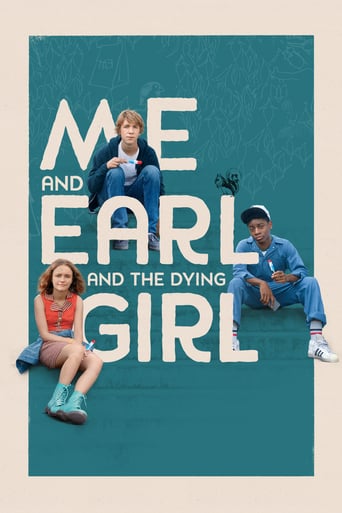

Camino (2008)
A religious organization interferes with the life of a terminally ill girl.
Watch Trailer
Cast


Similar titles
Reviews
It is hard to sit through "Camino" at times. The film, which is supposed to be based on a real incident in Spain, was adapted by its director, Jarvier Fesser. The basic premise is how blind faith can interfere with medical science causing horrible results. At the center, the young girl's family were members of the Opus Dei, an organization of ultra religious branch of the Catholic church that supposedly deals with attaining sainthood in everyone by acceptance and endurance to human suffering. Although it has nothing to do with Christian Science, we could not help comparing both types of practices, even if the latter one does not accept anything to do with the treatment of ailments by the medical profession.The story about this family happened fifteen years before 2001, when the action supposedly start. We are taken to meet Gloria and Jose, a couple in Madrid. They have two daughters, the eldest, Nuria, wants to become a nun. The youngest, the sunny Camino, is going to a catholic school. Gloria is a fervent follower of the teachings of the Opus Dei; her blind faith is a rare quality for anyone in the times we are living. Camino is a typical girl with aspirations and dreams, like any other of her friends in school. Tragedy strikes when Camino begins to suffer a debilitating illness that lands her in a hospital. The problem is a tumor that is pressing against her spinal chord and threatens to paralyze her. Gloria and Jose worry about what their daughter future will be. The mother insists Camino to offer her sufferings to God. When the operation does not get the results expected, and Camino keeps getting worse, it is decided to transfer her to Pamplona to be near Gloria's sister and Nuria, whose convent is there as well. Unfortunately, nothing can be done to save the young girl's life.Mr. Fesser goes after the machinations and manipulations behind the scenes of the branch of Catholicism that insists that faith will triumph over medical science. The only victim is Camino. The director gets an inspired performance from Nerea Camacho, who plays the sweet Camino, and Carmen Elias that appears as Gloria. This is no easy film to watch because of its subject matter as we witness the deterioration in front of our eyes of the young girl whose life is taken from her. Also in the cast, Mariano Venancio, and Manuela Velles.
I generally dislike the movies which are inspired by true stories about people who suffered a cruel illness, because I consider them to be a vulgar exploitation of the suffering of others for the entertainment of the audience and economical benefit to the producing companies. However, I think the film Camino is an exception, because even though it deals with the fight against a devastating illness, it also has an unexpected narrative deepness and tacit commentaries about controversial subjects which will be undoubtedly be interpreted in different ways by every spectator.In Camino, the faith in God from the main character and her mother is so intense that it goes beyond any rational level, even provoking behaviours which some people could consider as inhuman. And that is where the biggest value from this movie resides on. By soberly presenting that facet from the religious extremism, it makes us think about the price some people pay for their faith. In fact, one of the most interesting aspects from Camino is what it does not say...in other words, I am talking about all those tacit commentaries and significant pauses which subtly express what we are thinking, with a null level of dramatic artifice or ideological sermons. In summary, the film does not "say" too much about the subject it deals with; it simply provides spaces for us to insert our own ideology, leaving the verdict about the characters and their attitudes to our judgement.And that is the reason why Camino is so difficult to evaluate on an objective level. Any reaction this movie can generate will be based on our point of view, and as well as some people will be moved by the touching devotion from a girl with a pure spirit and an extraordinary nobility, other ones will think that she suffered the most horrible child abuse from her mother, who washed her brain in order to unquestionably accept a series of superstitions which blind the reason and bring a fake sensation of order and purpose into a chaotic and unpredictable world. On a similar way, some people will perceive the Opus Dei members who are interested in the main character as an easy candidate for the holiness as villains; and other ones will think they are pious heroes who will channel the suffering from the main character as a spiritual weapon in their fight against evil.And I could keep giving more turns about the multiple interpretations Camino offers, but I will limit myself to say that I found its neutral posture on the subject it deals with to be fascinating, that I liked the performances very much (particularly Mariano Venancio's one), and that I was left emotionally devastated in various scenes. The only thing I can say against this movie is that there are a few scenes which could have been deleted, because they do not add too much to what we already know and they feel a bit dull. However, that minor fail does not avoid me from enthusiastically recommending Camino as an excellent film which makes us to think and even to examine the ideology we have about religion.
Fesser draws what must be the most precise and accurate portrait of the behavior and social system of the members of one of the most dangerous among Catholic sect:The Opus Dei. It's a faithful, understated portrait, one that doesn't resort to easy caricaturization, only delivers the facts in a honest way. What comes out however is terrifying: A destructive sect manipulates and destroys the lives of all those that come in contact with them. For audiences that are not familiar with the workings of this religious sect, it may be revealing. Some of its scenes will stay firmly etched in those that watch them: The way the elder sister is manipulated into submission, alienated from family and reduced to a emotionless figure robbed of her freedom, self esteem and joy, the way the mother -the taliban- denies her husband and daughters any happy moments, torturing them with her self imposed beliefs and prohibitions, reducing them to puppets manipulated by her monstrous beliefs, or the scene when Camino, the dying child asks her sane sister, Nuria, who has just told her how envious she is of her because she will be going to heaven soon, whether she wants her to ask for Nuria's prompt death in her prayers. The film loses part of it's strenght when the director decides to film the dreams of the main character, colorful fantasies that do not match the mood and energy of the main plot. Tech work is superb, specially lensing, by Alex Catalán. Actors do a superb job at interpreting those deranged people. In all a powerful movie with some very minor flaws.
It is difficult to make an objective assessment of this movie taking into account the strong criticism of the Opus cult that underlies the movie.Camino is a fictionalized biography of Alexia Gonzalez Barros, a teeneger who died in 1985 after a short but painful illness. The director changes the main issue of the movie: the love that the real Alexia felt for Jesus is turned into a love for a real kid called Jesus (a common name in Spain). Is that mockery? It's difficult to say. Fesser transforms the love for a heavenly Jesus for a down-to-earth love for a kid. Nobody in the movie notices this except the father. I can understand the family didn't like the idea and, if as the director says, this is not a movie based in her story, to say at the beginning that the movie is based in real facts and to dedicate the movie to Alexia is misleading and, I fear, marketing oriented.Having said that, if you watch the film as it is, forgetting the facts that could support part of the movie, you will probably like it. Camino, the main character, is extremely well played and you cannot feel but strong sympathy for her. The narrative discourse of the movie, however, it is sometimes too affected by the continuous dreams of the girl, that at time are almost ridiculous in their cinematography.On the other hand, the movie is a good portrait of how the Opus works. Its sexism, its demand for obedience above all, its cult and sect ways of working at taking people from their families, that is portrayed honestly. The Opus characters, however, are mostly unidimensional, which makes them less believable.All in all, a good movie difficult to forget, not a masterpiece, with very good acting, that would have been better without marketing allusions to a real character that has little to do with the portrayed one. It is a film about love, a religious love that the director and writer makes terrestial.














